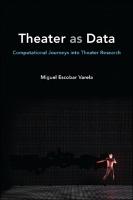Theater as Data
Computational Journeys into Theater Research
Abstract
In Theater as Data, Miguel Escobar Varela explores the use of computational methods and digital data in theater research. He considers the implications of these new approaches, and explains the roles that statistics and visualizations play. Reflecting on recent debates in the humanities, the author suggests that there are two ways of using data, both of which have a place in theater research. Data-driven methods are closer to the pursuit of verifiable results common in the sciences; and data-assisted methods are closer to the interpretive traditions of the humanities. The book surveys four major areas within theater scholarship: texts (not only playscripts but also theater reviews and program booklets); relationships (both the links between fictional characters and the collaborative networks of artists and producers); motion (the movement of performers and objects on stage); and locations (the coordinates of performance events, venues, and touring circuits). Theater as Data examines important contributions to theater studies from similar computational research, including in classical French drama, collaboration networks in Australian theater, contemporary Portuguese choreography, and global productions of Ibsen. This overview is complemented by short descriptions of the author’s own work in the computational analysis of theater practices in Singapore and Indonesia. The author ends by considering the future of computational theater research, underlining the importance of open data and digital sustainability practices, and encouraging readers to consider the benefits of learning to code. A web companion offers illustrative data, programming tutorials, and videos.
Keywords
Theatre studies; Acting techniquesDOI
10.3998/mpub.11667458ISBN
9780472128631, 9780472074792, 9780472054794, 9780472128631Publisher
University of Michigan PressPublisher website
https://www.press.umich.edu/Publication date and place
2021Imprint
University of Michigan PressClassification
Theatre studies
Acting techniques


 Download
Download